Master of Magic is a 4X game in where we take control of a wizard in his quest to become far more powerful than his peers, either through conquest or intensive study into his spellcrafting. It originally released in September 1994 to rather positive reception, albeit often panned for its plethora of bugs. They have more or less been ironed out since then, but a few annoyances ranging from mild to effectively making what is meant to be a powerful unit worthless. It is not unplayable by any means, though using the fan-made patch to fix many of these long-standing glitches that may frustrate you later on is highly recommended.
Starting off the game you are given 14 unique Wizards to choose from, all possessing different traits and varied affiliations to the five forms of magic. If you are playing on a difficulty other than the lowest “Intro” mode, you are given the option to customize your own character with a grand total of twelve books to distribute. These books can then be set to mix and match what types of magic you want to specialize in, with the more you set to a specific class, the more effective & efficient it will be as well as giving you a better chance to get their high tier spells. On top of that, you can also choose to trade in books for a trait, be it one that lowers the cost and maintenance of summoning creatures, to allowing you to begin your journey on a different plane of existence.
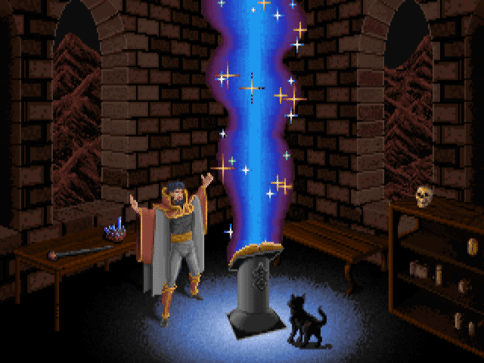
That is all before so much as choosing which of the fourteen races you want to lead. The amount of options at your disposal allows every play-through to feel fresh and opens up a world of experimentation. Once you finally make or choose the Wizard you want, you are thrust into a randomly generated world. There is no story or lore to learn, this adventure is your own and how you decide to go about things is up to you. At first, you are given a single town and a few units to explore your surrounding. These lands are littered with long forgotten ruins, caves, and temples to rummage through. Most of these will contain moderately powerful creatures that inhabit it, so if you wish to plunder whatever lies within, you must be ready for a fight.
By far the most important things to find are Nodes. They are split between the Sorcery, Nature, and Chaos realms of magic. If you step into one that falls outside your realm, you will be unable to cast spells in combat to damage the monsters that guard it, heal your units, or lend support in any way during the fight. There is a very small chance your spell may manage to slip past that node’s defenses, though it is rare and will cost you plenty of mana trying to do so. You will have to solely rely on the units you send in and hope they stand a fighting chance as you never truly know what you’ll be facing until you engage them. It may seem an impossible task with your starting units, though these magical beasts have one critical weakness. They don’t regenerate the creatures they lost. This means that through sheer attrition, you can send your men to the slaughterhouse and eventually conquer that node very early on.
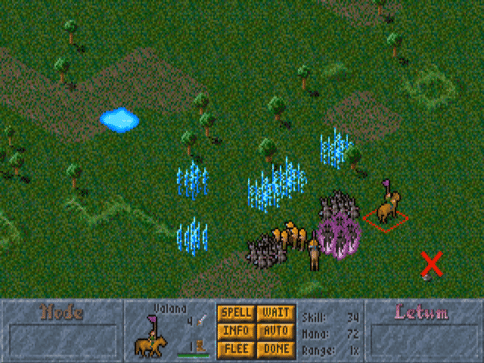
Depending on the playstyle you are going for, these are invaluable for the player that is pursuing magical superiority. Even if you are going for the economy or military strength ways of playing, clearing them out can be beneficial as you no longer have to worry about random enemies that may spawn from them. Clearing it won’t be the end of it however, you need to summon a Magical Spirit and physically land on the node to meld with it to receive its benefits. That means that if you didn’t have to foresight to summon one before hand, an enemy Wizard can send their own Spirit to the node and steal the reward of your hard-fought battle. Having any unit on the Node square will prevent that and they will need to defeat that army before having the chance to meld. As you may imagine, the more you control across the map, the more difficult it will be to defend and the costs of a standing army is pricey.
So why all the effort to claim and defend a Node? Well, they give you extra magical points to pour into one of the three magic stats you have. The first is Mana which dictates how much of it you’ll receive every turn. Next up is Research, this allows you to more effectively discover new spells from the books you’ve chosen at the start, meaning you’ll have access to far more powerful magic earlier. Last but not least is Skill. It may seem unimportant at first glance though nothing can be further from the truth. Skill gradually builds up every turn and effects how many spells you can cast every round or during combat. A Wizard with twenty skill will take five turns to cast a spell worth a hundred, while a skilled enough wizard may be able to cast it instantly.
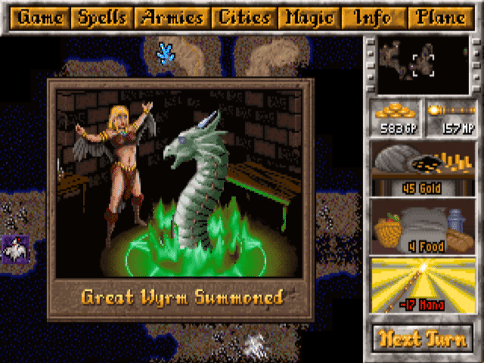
As you can no doubt tell by now, this is an incredibly deep game. Even after reading the manual, it may take you a few hours of gameplay to fully come to grip with all of its mechanics. But with all this complexity comes an equal amount of possibilities and freedom to experiment. Easily one of the most well known that fans of this title always boast about is the ability to cast a flying spell on your navy and bring fear to the land with your flying boats. That is only possible with the Sorcery school of magic, though the other four have their own equally interesting things to discover. With the incredible amount of spells on offer, your ingenuity will have its time to shine, even after many years of playing this title. Also worth noting is that every Wizard will have access to a sixth minor realm of magic called Arcane. It allows actions such as attempting to dispel magic, build items, or summon heroes.
Heroes come at in many forms. They can buff the army he leads, he can cast any spells you know if a magic user, or just be a plain dealer off death with his overwhelming stats. Summoning them is not the only way to obtain a hero, after winning difficult battles or capturing cities with your army, your fame will precede you and they have a chance of randomly offering their services to you. Much like your regular units, they don’t work for free. Each regular or hero unit will require a specific amount of gold and food every turn. If you ever run out of either, they will immediately leave your services. While all too willing to abandon your cause over a single missed meal, they are the backbone of your empire. Keeping them around for long periods of time and leading them to multiple victories will eventually level them up. Heroes can level up to far greater heights, but even a battle-hardened regular solider will be worth a ton more than a new recruit while in the battlefield, all while being paid the same.
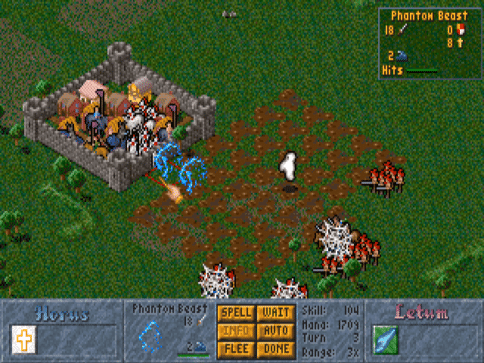
Summoning units works a bit differently. They require neither gold nor food, they require mana every turn and should you run out, it will immediately disappear like any other unit. These summoned creatures vary greatly depending on the realm of magic you use. Wizards that master Life can bring forth Unicorns which can teleport around during a fight, while those that choose Death can summon a Demon Lord who can, in turn, summon his fellow demons to overwhelm his enemies during combat. Those are just one example of many that can be summoned, each costing different amounts to cast and upkeep. They are known as Fantastic Units and are typically far stronger than any of your mortal troops. To balance that out, they do not gain any experience. Each is as powerful as it will ever naturally get from the beginning. Like in all things, your Wizard can mettle with this and cast spells to grant a variety of things to make it even deadlier.
After mentioning combat so much, let’s get to actually detailing how it functions, shall we? Once you encounter an enemy army or raid an area, it will transition into an isometric view in where both armies are lined up on the top and bottom of the screen retrospectively. Each unit will then take turns to move, fight, or use an ability. Ranged fighters all have a limited amount of ammunition, meaning that most of the times you will have to get in close and personal. This is where the variety of different factors come into play. Every unit has different defense, attack, resistance, hit-points, and movement stats to take into account. All are equally important and engaging each other will still result in injuries for both sides, despite you getting in the first shot. Attacking a unit with low defense and high attack may seem like a good idea, but it can pack quite punch before you slaughter it. Relying on a single tactic will not work here, you need to be two steps ahead.
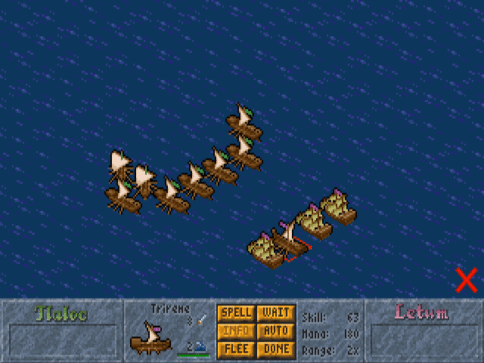
If a certain unit has multiple creatures, it losing some will have severe effects. So say your unit of four Shamans gets two men taken out by Archers, that effectively just halved your attack power. Meanwhile, a unit with a single creature will remain equally as dangerous while near death as it was going in. Each unit has a fixed number of people within it that can not be changed, meaning that putting two of the same troop types in your army will just result in two separate units. It gets much deeper than just the stats and the unit health system. For example, some creatures are invisible and can not be seen until they are right next to you, leading to quite a nasty surprise if you send all your melee fighters out ahead. Some can fly, which not only allows it to go over walls, but it results in your troops only being able to attack it with ranged or other flying beasts. Flying units will still take damage if they engage with a ground troop however.
There are so many possibilities and unique troop quirks to take into account that gives fighting a ton of depth. To add to the chaos, your Wizard can play a vital role in winning battles, even with a massively inferior army. There are all types of spells to harass your enemies with, and the more of the previously spoken of magical Skill you invested in, the more you can influence the tide of a battle using your magic. Doing so can get rather pricey, especially considering the amount of mana they consume multiplies the further away from the fortress you are. Only the Nature realm has a spell that allows you to move your fortress, the rest will really have to take into account how far these skirmishes are. That is unless you choose a costly trait to circumvent this issue while making a Wizard. This makes trying to conquer cities near a rival, far costlier and dangerous than defending your nearby lands as your foes have a much lower casting cost.
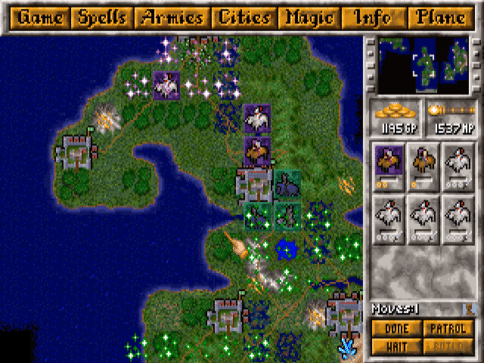
Magic can be used to seriously mess with your opponents like halving the production of a city, rendering surrounding lands useless via corruption, and so many other nasty effects. During combat, they can simply focus all their efforts into killing your valuable hero even if they have no chance of winning, simply out of spite. Not all spells are solely to cause damage. They can cause a unit to become possessed if their resistance stats are not high enough, you can turn a large area of the battlefield into mud to severely hamper movement, and even tear town a city wall. This will be a dirty and vicious fight all around, from battles to the over-world map. And you will eventually have to fight. There is diplomacy and an extremely costly to research spell to win the game without bloodshed, but rival wizards will eventually try to test your capability to defend yourself. More so when your lands are bordering and there is a mad dash to build cities in uninhabited areas.
Your first city is randomly placed on the map and you have to deal with what you have. The main factors of a cities success and ability to produce things are their surrounding lands, the amount of people, as well as how happy they are. Lush lands full of grass will get you more food, forests will increase your productivity, and so on. There are special resources such as gems or ore you will massively benefit from if you build a town near them. You are very much encouraged to expand your empire, and if that is not your playstyle, at the very least loot then burn rival towns into the ground. The buildings you can create are relatively simple and straightforward. Creating religious temples will lower unrest as well as produce some extra mana, library & schools will help with your spell research, and markets will bring in extra gold. Military-based buildings, on the other hand, has a more direct influence in that it will either allow your units to start off with some experience or allow you to build new types.
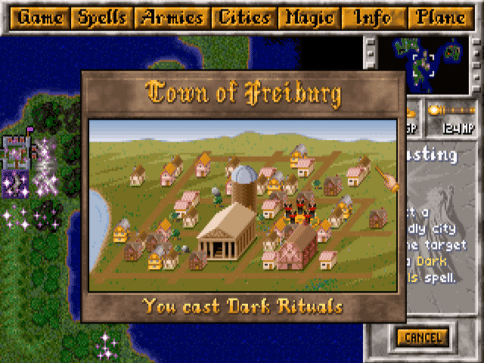
There is one thing each structure has in common. That is that each requires a certain amount of gold to maintain each turn, so you must think carefully where you create them unless you want to be bleeding money. It is nice if you can afford to have top-tier military buildings to spawn in a force to be reckoned with at a moments notice, though it may be wise to only do so near zones of conflict or near your capital in case things go south. The more buildings you have to maintain, the less you’ll have to pay your soldiers with. If things ever get bad enough you can convert mana into gold or vice versa at a two for one ratio. An example being you need 100 gold and in order to get that you’ll need to burn 200 mana. Once again, there is a trait you can start with for lossless conversion and is yet another thing that massively changes how you play.
As if you didn’t have enough to take into consideration, you may recall me saying there is a different plane of existence in the world. That plane is called Myrror, and is home to far more dangerous and powerful races than those found in the regular realm. Nodes can also be found in these new lands and as you may imagine, are guarded by far deadlier foes. With that risk, comes great rewards however. Nodes distribute twice as much magic points as normal and conquering a city of a new, vicious race can provide deadly units against your surface dwelling foes. It is equally as vast as your original plane, but what lies on the other side can be completely different than what is found in the same location. What is land in one place, can be a massive sea in the other and so on. Aside from certain unique spells, the only way to access this realm are via towers that you must clear out.
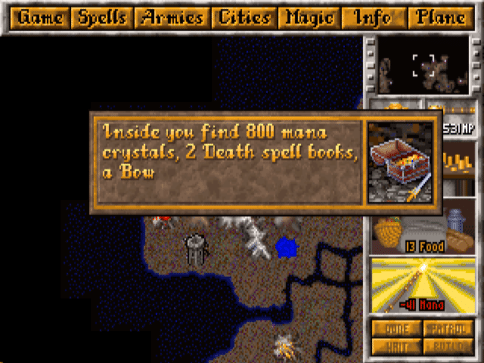
Said towers allow whatever unit you place on it to exist in two places at once. Click on the plane button to switch to the one you want to travel to and simply step off the tower title to enter that new world. Once you clear it out, anyone can use it, so similar to nodes you need to guard it least your hard work backfire on you. There are a fair amount of towers to find and crossing planes to reach another one can allow you to instantly be deep in enemy territory depending on where it is located. This allows you to launch a massive surprise attack but allows the same tactic to be used against you. Dedicating an army to guard that tower to deny access to the realm can be a tricky thing to do as it existing on two planes at once will allow ample opportunity to overwhelm them. On top of that, if your engineers build roads in Myrror, they instantly become enchanted and allows anyone to move throughout it using no movement points.
Enchanted roads are both a boon and a curse. For one it allows all your units to reach anywhere in a single turn, but so can the enemy if they break through and easily swarm your hard earned empire. War is a very tricky balancing act in this game. There are so many things and places that you need to defend, that it is easy to start losing resources every turn trying to keep it all under control. Nodes, towers, roads, cities, coastlines and more all across two different planes will put your foresight to the test. In quite an annoying flaw, it does a terrible job of informing you when an enemy is in sight. An army may be nearing your city and the only way of noticing that is by paying very close attention to the enemies turn as all their actions go by in fast forward. With how fast it is and how many things all of your rival wizards do within that short span, it is all too easy to not know you were in danger until they are literally attacking.
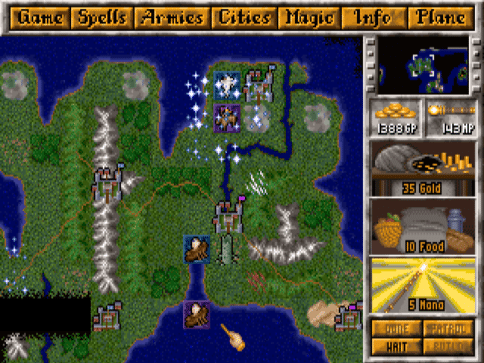
Another of its flaws is a simple UI quirk during combat. The auto-resolve command is far too close to the one used to end your turn, which can frequently lead to tragedy if not careful. Once you press it, the battle will fast forward and the AI immediately takes over with the extent of its strategy being charging all your units forward until dead. It is infuriating to being close to winning a hard-fought battle with no losses only to misclick and unnecessarily lose some of your valued men. A simple “are you sure?” message before taking away control would have done wonders here. The next flaw also occurs during combat. This one comes into play when you invade a node and have no way to attack flying units and for some reason, your enemies refuse to attack you either. Skip as many turns as you want but the enemy will not budge or do anything and you can not cast spells either if that node is counter to your magic specialty.
For a game from 1994, it is shockingly user intuitive. You can right click on units, spells and just about anything to learn more about them. From your cities menu you can see what spells you or enemies have cast on them, how much resources they are producing and what they are building. The army menu gives you an easy way to see all of your units, the way they are stacked and if they are active, as well as your heroes and item inventory. It is easy to see how Master of Magic was way ahead of its time and why it influenced so many future games of the 4X genre. Even to this day, it remains unsurpassed in some ways. The amount of content and replayability it offers is immense and it remains a title you should definitely give a try despite its age.
- Acrolyte Demo - April 11, 2025
- Lostaris Demo - April 4, 2025
- El Panadero -The Baker- Review - August 27, 2024